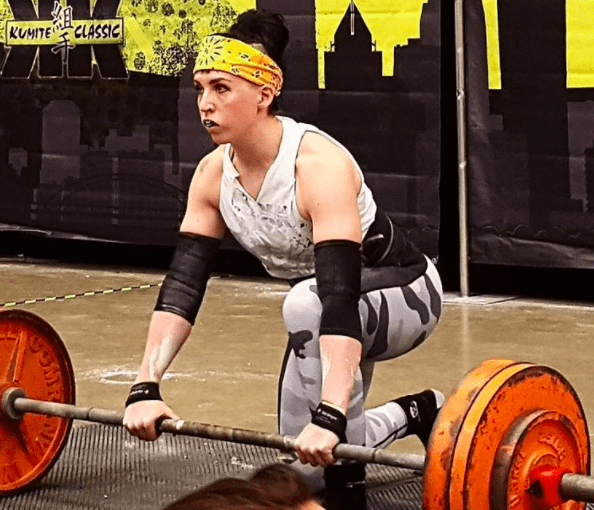As anyone who has competed in amateur strength sports knows, competing can be an amazing way to connect with your community, to push yourself past your perceived limitations and build confidence, as well as to have a hell of a lot of fun. But it seems fairly obvious that, by the numbers, we lose more often than we win. And even if we are not a “serious” competitor, sometimes it really, really hurts to lose.
Our ego can get really banged up, and the frustration that comes with that can be hard to deal with. This is actually one of the best parts about being a competitor. Trite as it may sound, often the deepest types of professional or personal growth are precipitated by massive failures. Competition provides a low stakes opportunity to confront and learn about ourselves during loss and thus grow as people.
When I say “low stakes,” I mean ninety-nine percent of the time, no one is going hungry because we didn’t win our Strongwoman competition. No one is getting evicted or broken up with, or losing a ton of money (unless you bet a ton of money on yourself? Probably not wise). So while emotionally the stakes may be very high, you actually have a totally risk-free platform to fail BIG. Which is great, because learning to trust yourself and take risks is terrifying when the stakes feel too serious. Competition lets you take all of the reward of pushing yourself to risk greatly, with none of the fallout of say, losing your job.
Now, I am far from a psychologist or one o’ them head-doctors, but I have competed a decent amount, and as far as losses and disappointments go, I’ve run the gamut of emotional experiences. There are different types of loss experiences in contest, and each one provides a distinct opportunity to learn about yourself as competitor and as a person.
Not Good Enough
Sometimes (or all the time), someone is just BETTER than you. They are stronger and faster. They have better technique.
When we lose to someone who got two more reps on the max deadlift than you did, here is an opportunity to learn from someone with more experience/better training/more drive than you. Talk to them. Ask them how they train. Maybe they weren’t stronger but they had better conditioning. Asking yourself to honestly evaluate your own performance opens you to finding skills to work on. In order to do this you have to learn to be okay asking for help and guidance, a skill that has a ton of real world carry over. This isn’t about comparing yourself to others in a dysfunctional way, it’s about looking for examples of how you could do things better next time, from people who are doing it well.
Off Day
“I just had an off day,” is something you will hear a lot. It is maddening, because it is often hard to quantify WHAT went wrong. Sometimes it is a perfect storm of bad circumstances – you had some drama in your personal life, stress at work, the kids got sick, you’re in debt and have bill collectors calling all hours.
Sometimes you’re just too tired and anxious and not feeling like yourself. You know, real life shit. It happens, and there is nothing you can do about it. When we feel this “offness” setting in, rather then throwing our hands up, getting pissed, and saying “I just can’t do it,” we have a chance to reflect on what our default thoughts are when things start going wrong. These thoughts can reveal deeper patterns that may be at work in our life in negative or positive ways. It is a chance to get to know ourselves a little bit better and treat ourselves a little more kindly.
The “Should Have”
For me, this one hurts the worst. It’s not about your strength or skill, it’s about (usually) your mental game or your nerves. You rushed the pick. You didn’t stick the lockout even though you had repped this weight a thousand times in training. For some, perhaps unbeknownst reason, you messed up something that you should have nailed. Now, it may be impossible to know the exact reason why you erred.
Regardless of why, this one hurts really bad because it attacks our ego – our idea of ourselves, or who we want to be seen as. This is an amazing opportunity BECAUSE it so intense. We may start questioning our abilities, questioning our value as an athlete, and feeling all kinds of crazy lows. This is your chance to stop and ask yourself why it’s so important to see yourself in this certain light – whether you come up with an exact answer or not, the ability to ask yourself this can lead to all kinds of personal insight.
Competition Is Life
When we compete, we are able to set personal goals and aspirations in an environment where there is tons of room to grow. Strength sports are growing exponentially, and whether you are a powerlifter, strongman, CrossFitter, or weightlifter, there is always room for more competitors on the field. Is winning and setting PRs always going to be pretty rad? Of course. But losing, coming to grips with our errors, and choosing to try again is fundamentally the greatest blueprint for living an awesome life that I can think of, because great risk is what success and joy demand. Trying and failing on the platform or field, and then trying again and again, teaches us how to constantly know and elevate ourselves to become the best people and competitors we can possibly be.
Editors note: This article is an op-ed. The views expressed herein are the authors and don’t necessarily reflect the views of BarBend. Claims, assertions, opinions, and quotes have been sourced exclusively by the author.
Featured image: @captainstarbuck on Instagram
